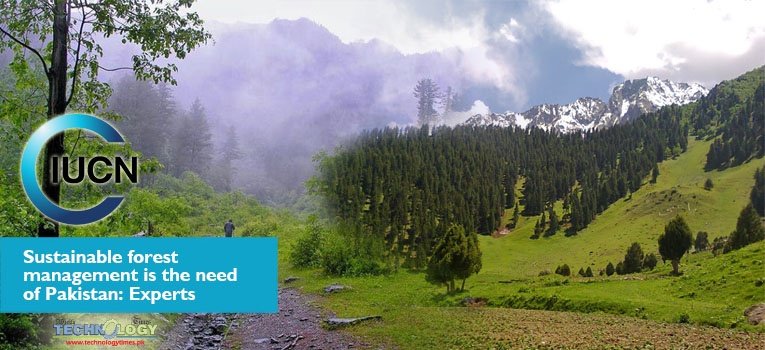Sustainable forest management needs introduction into Pakistan’s forestry which was highlighted by experts at a two-day workshop organized by IUCN and the Ministry of Climate Change, under the Sustainable Forest Management project on Sep 6-7, 2018.

About 60 senior forestry professionals, policy makers and managers from Forest and Wildlife Departments of Punjab, Khyber Pakhtunkhwa, Sindh, Balochistan Azad Jammu & Kashmir, Gilgit Baltistan and FATA participated in the workshop and shared the best practices from their provinces.
Key objective of the workshop was to document and disseminate the success stories in the field of forest conservation, wildlife management and biodiversity protection in the country.
The Sustainable Forest Management (SFM) project is funded by the Global Environment Facility (GEF) and is jointly implemented by the United Nations Development Programme (UNDP), the Ministry of Climate Change, IUCN Pakistan and the provincial Forest and Wildlife Departments of Khyber Pakhtunkhwa, Punjab and Sindh.
Technical papers and presentations were presented in the workshop to address key issues being faced by the provincial Forest Departments in the Forest Ecosystem Management.
Speaking on the occasion chief guest Mr. Mohammad Siddique Khan, Chief Conservator Forest, Khyber Pukhtunkwa said that the project aims to promote Sustainable Forest Management in Pakistan’s Western Himalayan Temperate Coniferous forests, Sub-tropical Thorn (scrub) forests and Riverine forests of Sindh and Punjab for biodiversity conservation, mitigation of climate change and securing of forest ecosystem services. This will ultimately result in addressing the climate change challenges in Pakistan.
During the welcome speech Mr. Mahmood Akhtar Cheema, Country Representative, IUCN Pakistan emphasized on the importance of the coordinated efforts at the national, provincial and international levels for documenting and disseminating the best practices and success stories.
He appreciated an increasing role of the non-traditional players like Pakistan Navy and Private Sector entities in the area of conservation where Pakistan Navy has planted around 3 million mangrove plants and the Karachi Conservation comprising Private Sector companies are planting one million mangrove plants.
He also presented the objectives of the SFM project which include: promoting sustainable forest management in Pakistan, conservation of Biodiversity, mitigation of climate change and securing forest ecosystem services.
He further said that during the course of the implementation of this project, IUCN will focus on establishing forest fire control systems in the provinces. Besides, seven landscapes have been selected for high conservation value forests in three of the province where the project is being implemented.
To set the scene, Ms. Fauzia Bilqis Malik, Project Manager, the Sustainable Forest Management made a presentation on the background of the Sustainable Forest Management practices in Pakistan and other countries.
Mr. Abdul Baseer, Conservator FATA presented management practices in Chilgoza Forests of FATA. He shared the current management system of Chilgoza and also the ill practices impacting the production as well as sustainable management of the Chilgoza.
He said that due to food quality, Chilgoza seed is eaten by human, birds, and wild animals, hence natural regeneration is low. However, natural protection similar to the Juniper Trees can make it possible for Chilgoza plants to survive.
If the Chilgoza forest can be declared as a natural heritage it will be a great support in sustainable management of this tree species.
Mr. Mohammad Ayaz Khan the National Project Manager of SFM project presented an overview of the project and highlighted the objective of this National workshop.
He also termed it as the first workshop of its kind will result in documenting these successes into a publication for sharing at all levels.Technical sessions were chaired by Mr. Aijaz Ahmed Nizamani, Chief Conservator Forest Sindh and Mr. Shahid Rashid Awan, Additional Secretary Technical, Punjab Forest Department.
The event generated healthy debate in resolving the issues at national level.